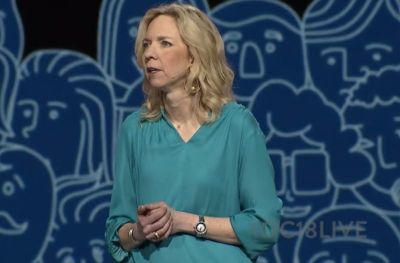2 most important words for young people anxious about COVID-19

“I’m a senior. How will I choose a college when I can’t visit any of them?”
“I’m in ninth grade and miss my friends. Seeing them on video isn’t the same.”
“I’m 23 and missing my last semester of college. Everything I was looking forward to is gone.”
The typical teenager or young adult might not grasp the full medical and economic consequences of COVID-19, but the emotional and relational aftermath of social distancing are all too real. In a mere week, feelings of elation due to no class and no work have devolved into feelings of isolation due to no friends and no fun.
Teenagers and young adults also have internal antennae that pick up any uptick in parental anxiety. Our adult stress over potential shortages of food, jobs, and health care doesn’t go unnoticed, magnifying the ambient uneasiness young people already feel. And for those who count on the nutrition and emotional support provided by school and work, the potential trauma of self-quarantine is even greater.
All these emotional burdens are intensified by the unknowns of how long this pandemic will last, and how many will fall ill, or even die.
In more typical times, it’s estimated that one in three US teenagers and adults will be affected by a diagnosable anxiety disorder during their lifetime.[1] We don’t yet have any data on the mental health effects of our current confinement, but it’s likely that anxiety and depression will become even more pervasive.
Based on research we conducted for our recent Faith in an Anxious World resources, I’m convinced what young people need most right now from parents, step-parents, and mentors is a two-fold response: empathy and empowerment.
When teenagers or twentysomethings complain about how COVID-19 is affecting them, your best response is first to let them know you empathize with a hearty, “Oh, that is really hard.” When your teenager complains about the hassles of online Geometry or your young adult is bemoaning that they can’t go out for dinner, it’s tempting to dismiss their problems and belittle their misery. But just like puppy love is real to a puppy, the pain that your young person is experiencing is painful to them. When you reply with “That sure stinks,” or “What a bummer. I’d be sad too,” you let them know that you are trying to honor their pain, not erase it.
Wise parents and mentors don’t stop there. In most situations, after you’ve sat with anxious young people and held their pain, you can pair empathy with empowerment by transitioning to the second key statement: “I think you can handle this.”[2] Or you might vary that by wondering, “What are you planning to do next?” When you sense a need for more support, you can gently ask, “What can I do to help you deal with this?” Whatever your tone and phrasing, your goal is to prevent your young person from being stuck in a negative spiral and instead take one next step forward.
Sometimes the most empowering next step a young person can take is to seek additional help. Perhaps they decide to process their COVID-19 emotions by identifying a friend they can text, or an adult they can call, when they feel especially low.
In some cases, what they most need is your recommendation of a mental health professional who can prescribe essential medical or behavioral interventions. If you don’t know a therapist to suggest, you can ask a nearby school or church who they might propose.
By letting our young people know that you know this is tough but you’re there to help them manage it, you’re enabling them to stand between the two extremes of denial and despair. As we enter a crisis of unknown duration, finding that middle ground is going to become even more essential.
If you or your young person need additional help, you can call the National Suicide Prevention Lifeline at 1-800-273-TALK, or chat online at suicidepreventionlifeline.org.
[1] Borwin Bandelow and Sophie Michaelis, “Epidemiology of Anxiety Disorders in the 21st Century,” Dialogues in Clinical Neuroscience, September 2015, 17(3): 327–335.
[2] Similarly to the themes of this article, Lisa Damour suggests two key words in responding to anxious young people: stinks and handle. Lisa Damour, Under Pressure (New York: Ballantine Books, 2019), 45.
Kara Powell, PhD, is the executive director of the Fuller Youth Institute (FYI) and a faculty member at Fuller Theological Seminary in Southern California. She is the co-author, with Brad Griffin, of Faith in an Anxious World.



























